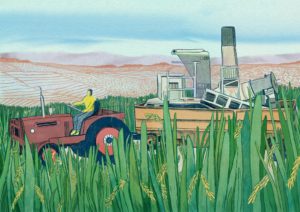
Marie Artuphel
Description
Green Keeper Africa develops eco-friendly solutions with a strong socio-economic and environmental impact. Its flagship product, GKSORB®, is an absorbent fiber made from water hyacinth, an invasive plant. This 100% organic and biodegradable fiber has the ability to capture and retain hydrocarbons thanks to its porous structure. It acts like a sponge, quickly and effectively absorbing pollutant liquids while being non-toxic and non-abrasive.
Context
Water hyacinth, an invasive aquatic plant, poses a significant challenge in Africa, particularly in Benin. It disrupts fishing communities, biodiversity, water quality, navigation, and tourism. Despite costly programs aimed at controlling its proliferation, completely eradicating the plant remains impossible due to its rapid reproduction capacity. Green Keeper Africa (GKA) has turned this challenge into an opportunity by incorporating water hyacinth into a circular economy model.
GKA’s circular economy approach focuses on the recovery and valorization of this harmful resource. Instead of merely destroying the water hyacinth, GKA collects and transforms it into a useful product: GKSORB®, a natural absorbent fiber designed to control hydrocarbon spills. This process generates positive economic, social, and environmental impacts. On one hand, it helps restore ecosystems affected by the plant’s proliferation by reducing its harmful effects on waterways and biodiversity. On the other hand, it creates economic opportunities for local communities.
Technical details & Operations
GKSORB® is a loose natural fiber that is 100% organic, biodegradable, non-toxic, and non-abrasive, developed through a process of selection, classification, transformation, and packaging of plant fibers. It is an effective and fast absorbent, capable of safely absorbing and retaining hydrocarbons. GKSORB has an absorption capacity of 900 to 1200%, meaning it can absorb up to 12 kg of hydrocarbons per kilogram of GKSORB, depending on the density of the substance. It is specifically designed to encapsulate up to 12 times its weight in hydrocarbons.
GKSORB has diverse applications, particularly for managing hydrocarbon leaks and spills in eco-friendly cleaning contexts. It can be used to protect industrial environments in various scenarios: on indoor surfaces (such as storage facilities or factories) or outdoor surfaces (such as parking lots or garages), as well as on water to recover hydrocarbons floating on the surface. The absorption time varies depending on the type of hydrocarbon: 5 seconds for light hydrocarbons (such as gasoline, solvents, or kerosene) and 60 seconds for heavy hydrocarbons (such as heavy fuel oil or crude oil).
Deployment & Impact
The project developed by Green Keeper Africa (GKA) has had a significant social and environmental impact by reducing poverty, creating jobs for women and youth, and addressing gender inequalities in the localities where its activities are implemented. Since 2015, GKA has mobilized lake communities to collect water hyacinth from Lake Nokoué, thereby generating direct employment opportunities. The network of collectors has grown from about ten to nearly 1,200 people, 85% of whom are women, fostering social and economic inclusion in these regions.
The project’s environmental impact is twofold. Upstream, the collection of water hyacinth helps reduce its proliferation, which poses a major threat to aquatic ecosystems. In 2020, this initiative resulted in the collection of 915 tons of water hyacinth, clearing 4.81 hectares of aquatic surface. As the initiative expands, its impact will grow, mitigating the problems caused by the overgrowth of aquatic plants in water bodies.
Downstream, the use of eco-designed products like GKSORB provides an effective pollution control solution. This product enables industries to better manage hydrocarbon and other pollutant spills while minimizing their environmental impact. GKSORB not only absorbs these substances quickly and safely but also ensures proper disposal of the pollutants, significantly reducing industrial pollution.





